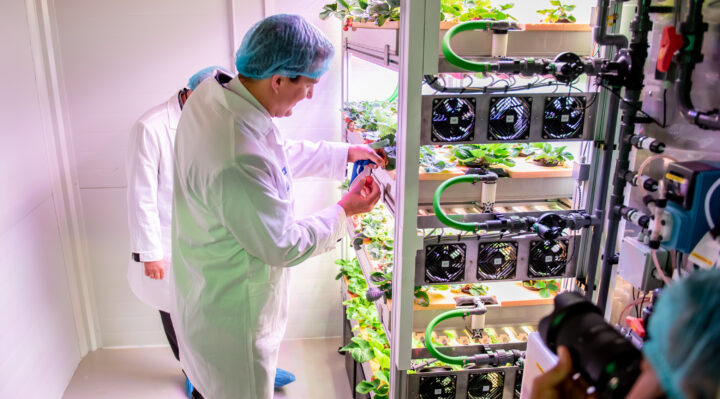Tungsram, one of Europe’s leading lighting manufacturers, has announced the opening of its vertical farm established for research and development purposes, a unique initiative in Central and Eastern Europe. Seeking to tackle the challenges of global food security and world hunger, the Hungary-based multinational company is committed to developing sustainable solutions that provide answers to the questions of tomorrow. The vertical farm, located in the Budapest headquarters of the company, leverages cutting-edge technology and the latest in indoor farming innovation.
Humanity faces a plethora of challenges and food security features high on the list of issues demanding a quick and sustainable fix. The Earth’s population is set to reach 9 billion people by 2050, with most of the increase forecast to take place in Africa, the continent that endures the most severe consequences of climate change. The continued growth in global population numbers means that 50% more food will be needed in 10 years, based on the current annual growth rate of 5%. Nevertheless, water resources and arable land are limited and shrinking, while converting forested areas accelerates climate change. Meanwhile, scientists are ringing alarm bells that the projected 1.5-5 degrees Celsius increase in average global temperature by 2050, that will translate into extreme weather conditions, including severe droughts and lethal heatwaves in certain parts of the world.

Sustainable solutions for food insecurity
Outdoor farming and traditional agriculture seem increasingly ill-equipped to provide a solution to the challenges posed by climate change and increasing population. Indoor farming, on the other hand, holds the key to ample food production in a sustainable and eco-friendly manner. Greenhouses and vertical farms can produce more food on considerably smaller growing areas and using less water, providing strategic food autonomy. Driven by this insight, Tungsram has been involved in developing lighting solutions for indoor farming, gaining considerable expertise in this area.
The company’s latest initiative, a vertical farm established for research and development purposes, builds on Tungsram’s century-long track record in manufacturing luminaries and its more recently acquired know-how in indoor farming. Tungsram’s vertical farm is an indoor agricultural facility that relies on specialized artificial lighting, thus enabling crops to be grown the whole year around. Vertical farms use only artificial lighting (as opposed to greenhouses where artificial lighting complements natural light), allowing farmers to grow plants all year-round, in a small space, regardless of the climate, even in urban environments. The controlled environment ensures a sharp improvement in the yield, quality and nutritional content of the crops with lower water usage than in traditional agriculture.
Light is the alpha and the omega of indoor farming; the proliferation of the LED technology has brought about a revolution in indoor farming as it allows for energy-efficient lighting conditions similar to natural light.
The closed system of a vertical farm means that hygiene is maximized and germs are kept at bay. Water usage can also be reduced by 95-98% compared to outdoor farming, guaranteeing a much higher degree of productivity.
Occupying a production area of 150 square meters, the farm boasts a hydroponic system where microgreens and baby leaves are grown exclusively under artificial, LED lighting. The solution renders variables, such as the amount of sunshine and weather conditions, irrelevant. Although it is of commercial size, the focus of the facility is R&D, which makes it unique in Central Europe. The farm houses two growth chambers where the research activity takes place and the company utilizes the results achieved here on the commercial-size farm.
The primary focus of research and development activities conducted at the facility is to identify the means and conditions necessary for making vertical farms suitable for mass food production. “What we want to create is more than just a stand-alone farm; our aim is to create an ecosystem that provides a solution for human and animal nutrition while reducing CO2 emission, electricity consumption and water consumption. Indoor farming technology, which could prove as one of the solutions for global food security, is the opportunity of our generation,” said Joerg Bauer, President & CEO of Tungsram Group.
Promoting research and development
Tungsram cooperates with several universities in Hungary and abroad and plans to expand these relationships. Tungsram’s lamps for indoor farming are currently being tested at the University of Wageningen in The Netherlands, the University of Reading in the UK and Germany’s Fraunhofer Institute known for its standard certificates. In Hungary, Tungsram works together with the Hungarian University of Agricultural and Life Sciences and they have just established a joint research institute and department (MATE-Tungsram Food Security Research Institute). In Tungsram’s vision, research is not an end in itself, but rather a means of creating marketable products, thus promoting innovation.
Tungsram is committed to tackling some of the most pressing challenges of our time: food security, liveable environment with lower energy consumption and cost, and most recently safe, sanitized environments – in short “Human Wellbeing”. The company builds systematically on its heritage in innovation, technology and materials know-how, leveraging its state-of-the-art expertise and infrastructure in the heart of Europe. Consequently, Tungsram is moving from analogue products to data-driven solutions – offering turn-key solutions, often including alternative funding models, to its customers.
